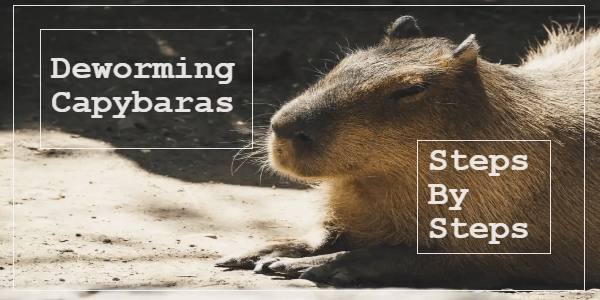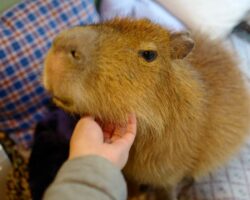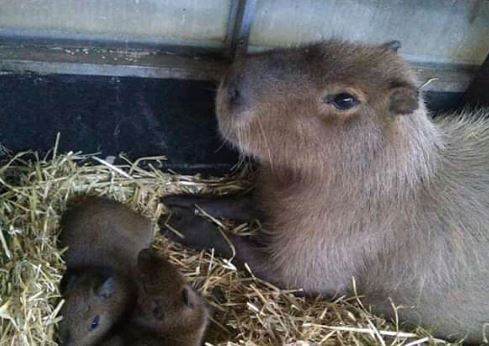Deworming A Capybara
Deworming is a routine that should be done every three months for a year and then once a year after that in the spring. You should consult with your vet about what kind of dewormer to use on your capybara’s fecal matter. Dewormers will either be oral medications or injections. The medication used depends on what kind of worms are present in your capybara’s fecal matter. Your vet will take a fecal sample and examine it under a microscope to determine which type of worm is present in the feces. Once the type of worm has been determined, then the vet will prescribe the correct dewormer to treat it
It is very important to deworm your capybara.
Deworming is a normal part of pet ownership, and it is important to deworm your capybara.
Deworming can prevent tapeworms, which are the most common type of worm in animals. Tapeworms can infect humans and cause severe health problems if not treated, so it’s important that you get your capybara checked regularly for this type of parasite by a vet or other professional animal health care provider.
Worms like roundworms and hookworms can also be deadly if they’re left untreated for too long—so regular deworming is essential for preventing these kinds of worm infestations from taking place!
Deworming is a normal part of pet ownership, and you should make it a routine for all the animals on your farm.
Deworming is a normal part of pet ownership, and you should make it a routine for all the animals on your farm. Deworming can be done once or twice per year depending on how frequently you deworm your capybaras. Most people will administer the dewormer with a pill that they give to their pet in its food or water (if there are no issues with swallowing).
The type of food or water that you give your capybara should not affect how often they need to be wormed. If it does, then ask your vet if there’s anything else they would recommend doing before deciding whether or not to use an alternative method like tablets instead of pills like Frontline Plus® Flea & Tick Control Tablets (for dogs).
Capybaras can get tapeworms if they eat the meat of an animal that has tapeworms.
Tapeworms are parasites that can be passed from one animal to another through the food chain. They are also transmitted by contact with the feces of an infected animal, so any meat you eat has a chance of being contaminated.
As a precautionary measure, it’s best not to feed your capybara raw meat or fish that has been exposed to tapeworms.
Capybaras can also get tapeworms from fleas and if they eat an animal with fleas.
Capybaras can also get tapeworms from fleas and if they eat an animal with fleas.
If you have a capybara, it’s important to know that your pet might be infected with tapeworms. Tapeworms are flatworms that grow in the intestines of animals and humans. They can cause serious health problems for both hosts, including diarrhea and malnutrition.
A capybara may be infected with these parasites by eating meat from an animal that has been exposed to tapeworm larvae (the larvae are passed out in feces). Cats or dogs may also spread these parasites through their feces while hunting rodents or rabbits on farms where no proper sanitation measures have been taken (like washing hands after handling raw chicken).
Capybaras can also get tapeworms from dog or cat feces.
Tapeworms are a common parasite in dogs and cats, but they’re also a risk to capybaras. If your dog or cat has tapeworms, it’s important to keep them away from the capybara so they don’t give him/her food. It’s also possible for your pet to get tapeworms from eating the meat of an animal that has them—for example, if you have an outdoor cat who likes to hunt small critters on the ground and bring home their kill as treats for you (or vice versa).
In addition to parasites such as fleas and ticks that may carry diseases like rabies and lice (that can spread through contact with saliva), there are also some other things that could make your dog sick:
Deworming should be done every three months for a year and then once a year after that in the spring.
Deworming should be done every three months for a year and then once a year after that in the spring. Deworming is important for capybaras because it will help keep your capybara healthy, which means you can enjoy your pet more! If you don’t deworm them on time, they could get tapeworms or other parasites that could be harmful to their health.
You should consult with your vet about what kind of dewormer to use on your capybaras.
The first step in deworming your capybara is to consult with your vet about what kind of worms are present in their feces. The vet will prescribe the correct dewormer to treat it, and this is an important part of pet ownership! Deworming is a normal part of pet ownership because it prevents future infestations by killing off any new parasites that might have been missed during the initial checkup.
Dewormers come as pills or tablets that must be given orally once a month for several months. They’re also available as drops (which are given subcutaneously) or ointments (which are applied directly on top of infected areas). If you’re not sure which type works best for your dog’s particular situation—and if you’ve already tried everything else—you should probably go with something topical instead…
Dewormers will either be oral medications or injections.
Oral medications are easier to administer and less expensive, but they’re not as effective. Oral medications are usually cheaper than injections, but it’s still important to consider cost when deciding which treatment option is best for your capybara.
- Injections are more effective than oral dewormers because they contain a higher concentration of medication and have fewer side effects compared with oral dewormers.
- When using an injection formula, you’ll need to give approximately 1 cc of solution per pound (2 cc per kilogram) of body weight once every 2 weeks until the parasites have been eliminated from your pet’s system.
The medication used depends on what kind of worms are present in your capybara’s fecal matter.
The medication used depends on what kind of worms are present in your capybara’s fecal matter.
- Tapeworms are treated with praziquantel.
- Roundworms (or “pinworms”) are treated with fenbendazole.
- Hookworms can be treated with fenbendazole or praziquantel depending on how many there are and where they’re located within the body, but generally speaking, this medication is most effective when used in combination with other medications such as deworming pills or liquid formulas like Interceptor Plus® that kill both internal and external parasites at once!
- Whipworms—which look like tiny pieces of thread sticking out from under the skin—are usually killed by drinking a mixture of garlic juice mixed into the water every day for two weeks before giving your pet another dose at home so he doesn’t become resistant over time (more info below).
Your vet will take a fecal sample and examine it under a microscope to determine which type of worm is present in the feces.
Your vet will take a fecal sample and examine it under a microscope to determine which type of worm is present in the feces. The results can take up to a week to come back, so be patient! If you want answers sooner than that, you can send your capybara’s poop directly to a lab yourself (a simple kit costs $20).
Once the type of worm has been determined, then the vet will prescribe the correct dewormer to treat it.
Deworming is a normal part of pet ownership. It’s important to keep in mind that there are several different types of worms, so it’s important to consult with your vet about what kind of dewormer to use on your capybaras.
You should also make sure you’re giving them enough food and water, as well as making sure they have access to shade during the summer months when they’re outside most of the day.
Without deworming, tapeworm infestations can become fatal for capybaras
Tapeworms can be fatal for capybaras. The biggest danger is that they will cause anemia, which leads to blockages in the intestines and other serious health problems.
The tapeworm’s eggs are passed out of its host through feces; this means that if you have a pet with tapeworms, you’re likely to find them in your own pooper long before you notice any symptoms!
Conclusion
Deworming is an important part of your capybara’s health. It’s also a good idea to speak with your vet about what kind of dewormer to use for your animal. The type of dewormer depends on what kind of worms are present in the fecal matter and how severe the infestation is. If you have any questions about deworming or any other animal-related medical issues, please feel free to contact us at (888) 888-8778 or visit our website at www.capybaracare.org


![Capybara Meat And Its Culinary Uses - [Every You Should Know] Capybara Meat & Culinary Uses](https://capybaratips.com/wp-content/uploads/2023/03/Capybara-meat-250x200.webp)



![What Is Capybara Hot Spring Competition? [EXPLAINED] What is capybara hot spring competition](https://capybaratips.com/wp-content/uploads/2022/05/Hot-Spring.jpg)
![How To Get a Pet Capybara Uk [Step By Step] How To Get a Pet Capybara Uk](https://capybaratips.com/wp-content/uploads/2023/03/Uk-Capybara-250x200.webp)

